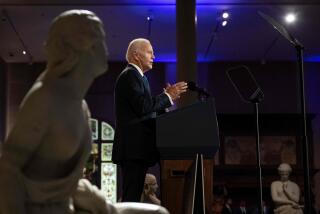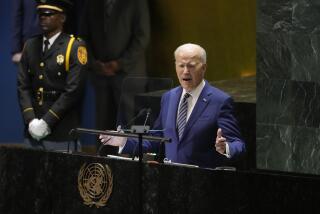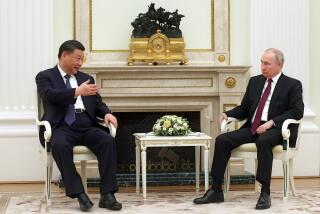Bush Hoping to Shore Up Yeltsin : Summit: Once disdainful of Russian leader, White House fears that his collapse would bring a more hostile successor. U.S. Embassy sees him as the best alternative.
WASHINGTON — Spurred by bleak assessments from senior U.S. analysts about the situation inside Russia, President Bush and his closest advisers have decided to go all-out to shore up Boris N. Yeltsin’s grip on power during the Kremlin leader’s meeting with Bush at Camp David on Saturday.
The Administration has concluded that if President Yeltsin falls, his successor almost certainly will be someone far more hostile to U.S. interests, officials said.
“The only alternative to Yeltsin,” said one Administration official, “is Stalin--an authoritarian regime.” Bush, he added, has “got to show the Russian people that Yeltsin has an in.”
Only two months ago, senior Administration officials were almost openly disdainful of Yeltsin and sought to prop up the more predictable Mikhail S. Gorbachev. Even as recently as three weeks ago, senior advisers to Bush were said to have concluded that Yeltsin was such an unreliable champion of reform that the Administration might be best off maintaining some distance from him.
But now, with Yeltsin in charge and fighting for political survival, it is he who will be anointed in a deliberate presidential signal to his restive homeland.
That Bush will open his arms to the Russian leader was described by sources as the result of warnings by the U.S. Embassy in Moscow and other government agencies that Yeltsin stands as the last best chance for democratic reform in Russia.
“Without depicting Yeltsin as a white knight,” one official said, repeating an argument U.S. Ambassador to Russia Robert S. Strauss was said to have made to Secretary of State James A. Baker III, “this is about the best government they’re going to have. . . . There’s not a better alternative out there to try.”
White House officials were stunned by the speed of Gorbachev’s ouster. Now, they are increasingly concerned by what they see as the inevitable authoritarian and nationalistic character of the opposition to Yeltsin, as well as the absence of any other leader with remotely his ability to command broad support across Russia.
This consensus has led to the determination to try to ensure that there will not be another “skip in the heartbeat,” one Administration source said.
In the immediate context of Saturday’s visit, White House officials hope to convey their new regard for Yeltsin by offering the once-scorned country cousin the same personal and ceremonial gestures made to Gorbachev when he visited Washington two years ago: An intimate lunch at storied Camp David, a special presidential Windbreaker with the Russian leader’s name embroidered on it, perhaps even a one-on-one stroll along the wooden pathways of the rustic mountain retreat.
Bush and Yeltsin are also expected to announce plans for a second meeting later this year, most likely a formal state visit to Washington by the Russian leader.
Measured against the staggering problems besetting Yeltsin and his shattered country, presidential hospitality and souvenir jackets may seem paltry.
And some senior government analysts say that ultimately the United States may face a need to offer far more concrete steps to help Yeltsin’s government survive, including the kind of substantial financial support that Bush has steadfastly avoided for political and other reasons.
At bottom, these analysts say, Yeltsin is engaged in a desperate race against the clock, spending his present popularity to buy time for his country to find a way out of an economic and social quagmire that now threatens to swallow it.
Unless Yeltsin can maintain popular support long enough to fend off an inevitable backlash, analysts have decided, the reforms he champions may die.
“His popularity is going to go down,” a senior government analyst said. “It’s a question of whether his popularity goes down faster than things stabilize.”
“We’ve got to give him a chance to grow a little,” said Ambassador Strauss said in an interview.
For now, officials are convinced that the highly visible embrace planned for the Camp David summit will help.
Acceptance by the West is thought to be important to Yeltsin and his supporters. One of Yeltsin’s aspirations, a U.S. official said, is to have “a gold card in Bush’s Rolodex.”
With the old Soviet empire gone and former individual republics now flaunting their sovereignty as independent states, Yeltsin and those around him can use the fact that he is being singled out for special treatment as the basis for an appeal to Russian pride.
“It will help him in Russia,” a U.S. official said, “because it’s Russia that’s being accepted as one of the great powers.”
While the primary focus of Bush’s summit efforts will be to bolster Yeltsin, the American President will also use conversations at the United Nations today and Camp David on Saturday to nudge Yeltsin toward a less-expansive view of his power, reminding him that Ukraine, Kazakhstan and other republics must be left to determine their own direction.
The two leaders will also review the status of U.S. and international efforts to aid Russia’s economy and of the Middle East peace conference that the two nations are co-sponsoring.
Arms control is also on the agenda. The two leaders will review their new proposals for major new reductions in their nuclear weapons arsenals.
A senior Administration official said Thursday that Bush will seek agreement on a timetable for further talks that would incorporate negotiations on space-based missile defenses and the Anti-Ballistic Missile Treaty as well.
But those talks will be constrained by a transformation that, for all the effort to treat Yeltsin like Gorbachev, have made this summit different: This time, the man from Moscow cannot speak for the complete old Soviet arsenal or make unilateral deals about its future.
The White House suggested publicly that the Russian leader’s newest proposals had set the stage for “very productive talks” this weekend. But an Administration official noted later that real progress would require the cooperation of the absent leaders of Kazakhstan, Ukraine and Belarus.
Still, another U.S. official said, “this meeting isn’t about arms control. It’s about doing what we can to keep Yeltsin in power.”
Bush and Yeltsin are well short of being on the “George” and “Boris” footing that is the lingua franca of Bush’s style in dealing with world leaders. But the American patrician and the Russian swaggerer could hardly be a more unnatural pair.
U.S. officials still shake their heads when they tell of Yeltsin’s first trip to the White House, in which the upstart populist droned on nearly nonstop during an hourlong meeting with National Security Adviser Brent Scowcroft and then demanded to see Bush.
His manner “comes across as unnecessarily blunt,” one official who now admires him said of Yeltsin last week.
His knack for breaking china--and stories about his alleged drinking and buffoonery--still leave U.S. officials exasperated. On the eve of the Camp David summit, none seemed confident that he would make it through the weekend without committing at least one gaffe.
The abrupt about-face in U.S. policy toward a leader from Moscow is not unprecedented, however. As recently as 1989, White House spokesman Marlin Fitzwater was still scorning Gorbachev as a “drugstore cowboy.”
And with Yeltsin, as with Gorbachev, officials insist that the reasons for their newfound chumminess go beyond a mere sense of resignation. If Yeltsin at first showed a disturbing inclination to use force to reclaim extra-Russian territory, he has recently showed signs of being more accommodating to his neighbors.
And if he was once regarded as a very heavy drinker, he is thought now to have become more moderate.
In Moscow this week, aides to Baker pronounced themselves impressed with Yeltsin’s mastery of details and more statesmanlike appearance. So openly are some people within the Administration now rooting for Yeltsin, in fact, that those who once were determined to maintain their distance because of his bad habits now have taken to worrying aloud that he ought to take better care of himself.
More to Read
Sign up for Essential California
The most important California stories and recommendations in your inbox every morning.
You may occasionally receive promotional content from the Los Angeles Times.











